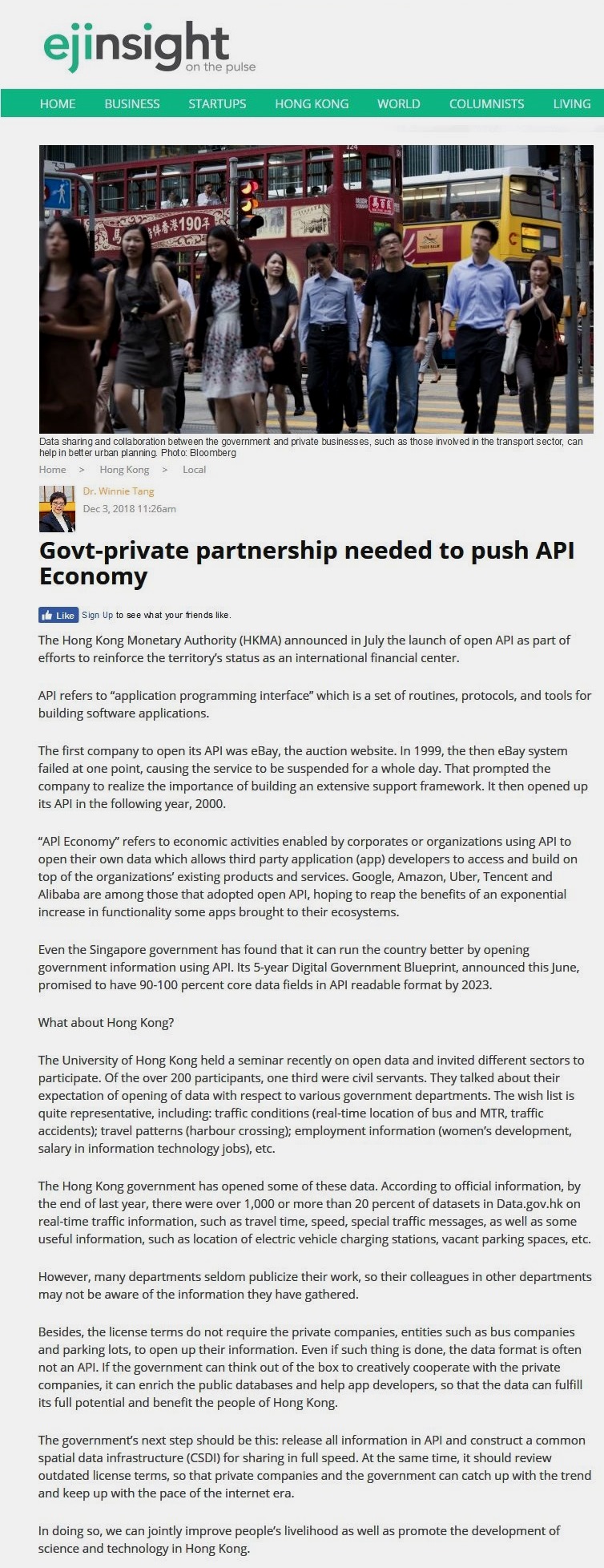網上版請按此

Govt-private partnership needed to push API Economy
The Hong Kong Monetary Authority (HKMA) announced in July the launch of open API as part of efforts to reinforce the territory's status as an international financial center.
API refers to "application programming interface" which is a set of routines, protocols, and tools for building software applications.
The first company to open its API was eBay, the auction website. In 1999, the then eBay system failed at one point, causing the service to be suspended for a whole day. That prompted the company to realize the importance of building an extensive support framework. It then opened up its API in the following year, 2000.
"APl Economy" refers to economic activities enabled by corporates or organizations using API to open their own data which allows third party application (app) developers to access and build on top of the organizations' existing products and services. Google, Amazon, Uber, Tencent and Alibaba are among those that adopted open API, hoping to reap the benefits of an exponential increase in functionality some apps brought to their ecosystems.
Even the Singapore government has found that it can run the country better by opening government information using API. Its 5-year Digital Government Blueprint, announced this June, promised to have 90-100 percent core data fields in API readable format by 2023.
What about Hong Kong?
The University of Hong Kong held a seminar recently on open data and invited different sectors to participate. Of the over 200 participants, one third were civil servants. They talked about their expectation of opening of data with respect to various government departments. The wish list is quite representative, including: traffic conditions (real-time location of bus and MTR, traffic accidents); travel patterns (harbour crossing); employment information (women's development, salary in information technology jobs), etc.
The Hong Kong government has opened some of these data. According to official information, by the end of last year, there were over 1,000 or more than 20 percent of datasets in Data.gov.hk on real-time traffic information, such as travel time, speed, special traffic messages, as well as some useful information, such as location of electric vehicle charging stations, vacant parking spaces, etc.
However, many departments seldom publicize their work, so their colleagues in other departments may not be aware of the information they have gathered.
Besides, the license terms do not require the private companies, entities such as bus companies and parking lots, to open up their information. Even if such thing is done, the data format is often not an API. If the government can think out of the box to creatively cooperate with the private companies, it can enrich the public databases and help app developers, so that the data can fulfill its full potential and benefit the people of Hong Kong.
The government's next step should be this: release all information in API and construct a common spatial data infrastructure (CSDI) for sharing in full speed. At the same time, it should review outdated license terms, so that private companies and the government can catch up with the trend and keep up with the pace of the internet era.
In doing so, we can jointly improve people's livelihood as well as promote the development of science and technology in Hong Kong.
Dr. Winnie Tang
Honorary Professor, Department of Computer Science, The University of Hong Kong